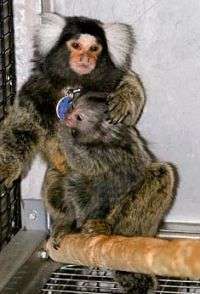Baby's smell tamps down dad's testosterone levels

Does eau de infant make dad a better parent? It does, it seems, if you are a common marmoset, a New World monkey known for its collaborative approach to rearing offspring.
In a new study from the Wisconsin National Primate Research Center (WNPRC) at the University of Wisconsin-Madison, researchers found that marmoset dads that get a whiff of their own babies experience decreased testosterone.
"We were a little surprised to see testosterone alter like that," says Toni Ziegler, a staff scientist at the WNPRC and the senior author of a study published Sept. 2 in the journal Biology Letters. "What we're seeing is that the system is flexible and that it can adjust up or down. It might be important for testosterone to be really flexible because there is a lot going on in the life of the primate dad. These moderations may allow him to be more tolerant toward his infants while facing external challenges that might distract him from focusing on his infant and family needs."
Testosterone is the most abundant, if not the most potent, male hormone in primates, including humans. Produced by the adrenal gland and the testicles, testosterone promotes the maintenance of secondary male characteristics, including such things as muscle mass and strength, fat distribution, bone mass and sex drive. Some studies suggest it may also contribute to male aggressiveness.
Marmosets live in family groups and are prolific breeders. Fathers play a big role in raising their young, joining the female in a care-giving role within a few hours of the birth of offspring, which frequently arrive in pairs. Marmoset babies are also large, each coming into the world at 10 percent of adult weight.
"The female totally needs help. She can't assume all of the parenting responsibilities on her own," says Ziegler, noting that marmoset females also typically become pregnant again within a few weeks of giving birth. "They need a lot of help. That's where the dads come in."
Marmoset males are known to be responsive to female scents, but the new Wisconsin study is the first to show that male physiology can also be influenced by a particular odor from a baby marmoset.
The new study was conducted by isolating experienced male marmoset fathers from their families — and their odors — and presenting them with either a scent from their infants' genital area or a control scent. Similarly, males with no experience as parents were presented with the same odors. Blood tests taken within 20 minutes of exposure revealed a marked decline in testosterone for only those experienced males given the scent of their own babies.
"This shows the male is responsive to chemical cues from their infants," explains Ziegler. ""We saw no behavioral response, but we saw in every single father a significant decline in testosterone."
The finding is interesting and mildly surprising, says Ziegler, because while depressed levels of the hormone may aid the father in his care-giving role, he still must assume important responsibilities such as defending his turf and family, behaviors that may benefit from a jolt of testosterone as opposed to lower levels of the hormone.
"What we are seeing is the system is flexible and that it adjusts up and down," says Ziegler. "It is interesting that the infant can have this parenting effect on the fathers."
In addition to Ziegler, co-authors of the new report include Shelley Prudom, Carrie Broz, Nancy Schultz-Darken and Charles Snowdon, all of UW-Madison; and Craig Ferris of Northeastern University. The study was supported by grants from the National Institutes of Health.
Provided by University of Wisconsin-Madison
















